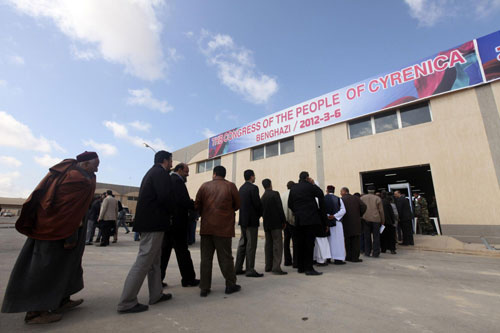Libya's oil-rich east declares autonomy
 |
|
People stand in line to attend a founding conference of the council of the Cyrenaica province in Benghazi March 6, 2012. [Photo/Agencies] |
TRIPOLI - Tribal and political leaders in eastern Libya declared Cyrenaica an autonomous region during a ceremony held in the city of Benghazi on Tuesday.
The leaders also appointed a council to manage regional affairs. Ahmed Zubair al-Senussi was elected as chairman of the council at the ceremony attended by 3,000 delegates.
Cyrenaica, known as Barca in Arabic, stretches from the central coastal city of Sirte, where slain ruler Muammar Gaddafi was born, to the Egyptian border. The tribal leaders plan to name Benghazi, the cradle of the protests leading to Gaddafi's fall, as the autonomous area's capital.
Also, under their plan, the region will have its own legislatures, courts and police force, while the power of foreign policy making will be left to the central government in Tripoli.
The tribal leaders' declaration was made despite the interim central rulers' strong rejection and their promise to decentralize the government across the country.
Meanwhile, hundreds of protesters have reportedly taken to the streets in Benghazi and Tripoli, showing their support for the National Transitional Council (NTC), who have been ruling Libya since the ouster of Gaddafi.
Political changes in Cyrenaica can immensely impact the NTC's rule as the eastern region has most of Libya's oil wealth and Benghazi is home to the country's biggest state oil company.
Federalism, which the tribal leaders refer their political demand to be, was the way Libya was governed in the mid-20th century. Cyrenaica was one of the three regions where power was devolved, the other two being Fezzan and Tripolitania.
However, Libya's administration was drastically centralized under Gaddafi, who came to power through a military coup in 1969. Since the end of Gaddafi's 42-year rule, some regional leaders have been calling for a return to federalism.
The NTC has earlier voiced their support for a decentralized political system, but not federalism.





















